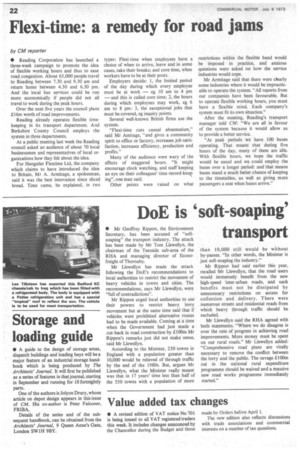Flexitime: a remedy for road jams
Page 24

If you've noticed an error in this article please click here to report it so we can fix it.
by CM reporter • Reading Corporation has launched a three-week campaign to promote the idea of flexible working hours and thus to ease road, congestion. About 65,000 people. travel to Reading between 7.30 and 9.30 am and return home. between 4.30 and 6.30 pm. And the local bus services could be run more economically if people did not all travel to work during the peak hours.
Over the next five years the council plans £16m worth of road improvements.
Reading already operates flexible timekeeping in its transport department. And Berkshire County Council employs the system in three departments.
At a public meeting last week the Reading council asked an audience of about 70 local businessmen and representatives of local organizations how they felt about the idea.
For Hengstler Flextime Ltd, the company which claims to have introduced the idea to Britain, Mr A. Armitage, a spokesman, said it was the best innovation since sliced bread. Time came, he explained, in two types: Flexi-time when employees have a choice of when to arrive, leave and in some cases, take their breaks; and core time, when workers have to be at their posts.
Employers decide: 1, the limited period of the day during which every employee must be at work — eg 10 am to 4 pm — and this is called core time; 2, the hours during which employees may work, eg 6 am to 8 pm: 3, the exceptional jobs that must be covered, eg inquiry points.
Several well-known British firms use the system.
"Flexi-time cuts casual absenteeism," said Mr Amitage, "and gives a community spirit to office or factory, increases job satisfaction, increases efficiency, production and profits."
Many of the audience were wary of the effects of staggered hours. "It might encourage clock watching, and staff keeping an eye on their colleagues' time record-keeping", one man said.
Other points were raised on what restrictions within the flexible band would be imposed in practice, and anxious questions were asked on how the service industries would cope.
Mr Armitage said that there were clearly some industries where it would be impracticable to operate the system. "All reports from our companies have been favourable. But to operate flexible working hours, you must have a flexible mind. Each company's system must fit its own situation."
After the meeting, Reading's transport manager told CM: "We are all in favour of the system because it would allow us to provide a better service.
"At peak periods we have 100 buses operating. That means that during five hours of the day, many of them are idle. With flexible hours, we hope the traffic would be eased and we could employ the buses over a longer period: and'that means buses stand a much better chance of keeping to the timetables, as well as giving more passengers a seat when buses arrive."




























































































































































